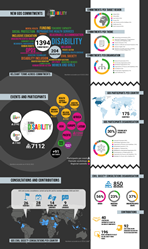
The Global Disability Summit 2022 in numbers
“Everyone, everywhere must be free to go to school, to access health care, to start a family, have decent work and participate fully in all spheres of economic, social, cultural, and political life,” said UN Secretary-General António Guterres.
GENEVA, Switzerland (PRWEB)
February 28, 2022
Hosted by the Governments of Norway and Ghana along with the International Disability Alliance (IDA), the two-day Summit was the world’s biggest gathering of global leaders and disability groups dedicated to commit to change for people with disabilities. It also included the first Youth Summit, Civil Society Forum, Regional Summits, Thematic Workshops, Roundtables and 92 side events.
This is the second-ever global Summit on strengthening the inclusion of people with disabilities and it built on the progress made at the first Global Disability Summit in London in 2018.
On the second day of the Summit, the Governments of Germany and Jordan were announced as the co-hosts of the third Global Disability Summit, which will take place in Berlin, Germany in 2025.
The virtual two-day Summit saw more than 7112 participants. Highlights included:
- By the end of the Summit, 1394 commitments to disability rights were made.
Commitments were made by some governments for the first time, including the United States, Spain, and Denmark.
- Speakers pledged to do more to work directly with organisations of persons with disabilities and engage people with disabilities in decision making.
- It was attended by high-level representatives from some of the world’s most prominent development organisations, including the United Nations, the World Health Organization and the International Committee of the Red Cross, along with private companies like Microsoft, who all made commitments.
Commitments were announced by a range of governments and organisations on areas covering education, employment, health, climate change, gender equality, humanitarian crisis and the post-COVID-19 response. There were also pledges to ensure the participation of organisations of people with disabilities, and that there was meaningful consultation with them when vital decisions were taken. For example:
- The USA made 23 commitments on disability rights, including $25 million on assistive technology. This is the first time the country has made commitments at the summit. USAID Administrator, Samantha Power said, “As we continue to build back better, we will ensure that we deal everybody in and bring everyone along”.
- Host country Norway launched its first disability inclusion strategy which includes increasing opportunities for people with disabilities in the job market and including their needs in disaster risk reduction and climate change adaption. It also pledged to include disability legislation in its domestic law.
- Future host country, Jordan, pledged to continue strengthening and improving the effectiveness of non-discrimination and affirmative action policies and legislation.
- The United Kingdom announced 18 new commitments including a new disability inclusion strategy up to 2030 which focuses on issues including climate change, women’s sexual health and violence towards women and girls. They will also fund the Global Action on Disability (GLAD) Network, a coalition of bilateral and multilateral agencies, public and private foundations as well as key coalitions of the disability movement with a common interest in achieving inclusive international development and humanitarian action.
- The World Health Organization made commitments to address disability discrimination in the health sector and crisis response with a focus on climate change, and to improve the collection and use of data on disability.
- Australia pledged to develop a policy to protect the rights of people with disabilities worldwide.
- Malawi committed to adopt a Zero Rejection Policy at all levels of education in-line with provisions of the Disability Act, the Malawi Constitution and the UN The Convention on the Rights of Persons with Disabilities (CRPD) by 2022.
- Denmark will work to combat gender-based violence in crises. As the global lead of Call to Action on Protection Against Gender-Based Violence in Emergencies 2021-2022, Denmark is committed to advocating for the inclusion of people with disabilities in efforts against gender-based violence in humanitarian contexts.
- Kenya committed to providing funding for organisations of persons with disabilities.
- The European Commission promised €5 million to the UN Partnership on the Rights of Persons with Disabilities (UNPRPD).
- Microsoft pledged to develop and implement accessible technology globally.
- Spain made commitments to increase meaningful participation of OPDs in climate change action, along with promoting partnerships that aim to address the digital divide.
- Sweden pledged to raise awareness of disability with their partners working on sexual and reproductive health and rights.
- Uganda committed to increase government spending on special grants in empowerment for people with disabilities and to focus on mental health policy.
- Germany has committed to host the next Global Disability Summit in 2025.
- Save the Children made 12 new commitments, including using their leverage to support children with disabilities.
- The Right Honorable Gordon Brown, as UN Envoy for Global Education, called for all education funders to do more to include children with disabilities and make classrooms more accessible.
In his opening speech UN Secretary-General, António Guterres, called for global financial investment in disability inclusion and said, “Everyone, everywhere must be free to go to school, to access health care, to start a family, have decent work and participate fully in all spheres of economic, social, cultural, and political life”.
More information can be found on the Global Disability Summit website, where a full list of the commitments has been made public: http://www.globaldisabilitysummit.org.
For updates and announcements follow us on Twitter at: @GDS_Disability
Share article on social media or email:

